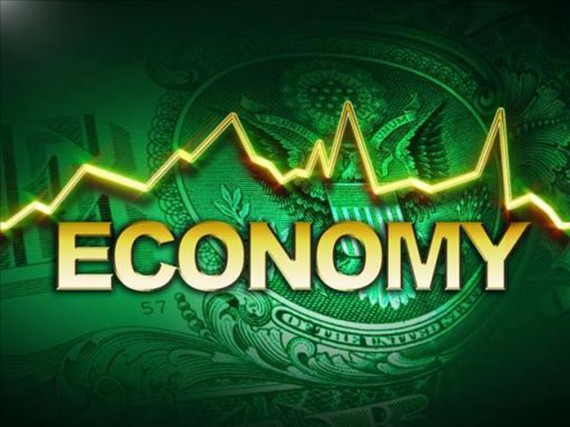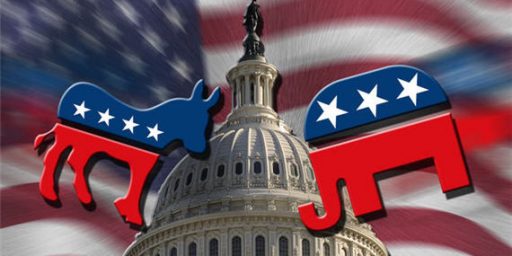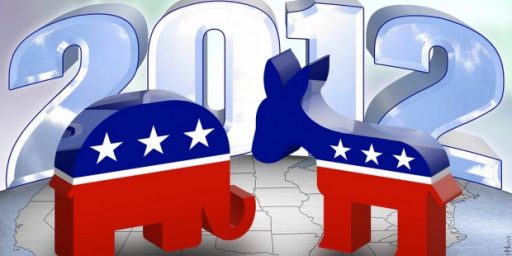First Quarter GDP Revised Slightly Downward
The first revision to the first quarter GDP report released last month came out this morning and it showed a slight revision downward, but otherwise actually had some positive news:
WASHINGTON — A drop in government spending dragged more on the U.S. economy than initially thought in the first three months of the year, although consumer spending looked relatively resilient to Washington’s austerity drive.
Other reports on Thursday showed the number of new jobless claims rose modestly last week while contracts on previously owned homes climbed to a three-year high in April.
Together, the reports pointed to an economy that has held up reasonably well despite government constraints, but nevertheless faced headwinds severe enough to dissuade the U.S. Federal Reserve from trimming its monetary stimulus in the immediate future.
“(The reports) paint the picture of an economy with strengthening fundamentals that is facing significant fiscal drag,” said Ellen Zentner, an economist at Nomura in New York.
Gross domestic product, a measure of the country’s total economic output, expanded at a 2.4 percent annual rate during the first quarter, down a tenth of a point from an initial estimate, the Commerce Department said.
Analysts had forecast a 2.5 percent gain.
Government spending tumbled at a 4.9 percent annual rate, which was faster than the 4.1 percent rate initially estimated. Also holding back growth during the quarter, businesses outside the farm sector stocked their shelves at a slower pace.
The one bit of positive news is the fact that there was an increase of real final sales of domestic product from 1.5% in the “advance” report issued last month to 1.8% in the report released today. That didn’t impact the bottom line number, but it is an indication that the economy was relatively solid in the 1st quarter and that we’re unlikely to see a major change in the numbers when the final report comes out at the end of June. Of greater interest will be the numbers for the 2nd quarter and the question of whether or not the sequester has had a significant impact on the economy. The fact that the first quarter saw declines in government spending during a period that mostly covered the period before the sequester took place suggests that government agencies were already planning for the sequester by cutting back spending earlier in the year. There is also evidence of sequestration anticipating cutbacks in the 4th quarter of 2012. If that’s the case, then we may not see a major impact from the sequester in 2nd quarter GDP.






So the sequester IS hurting the economy. Imagine that. Guess the austerians are wrong again. They maintain their perfect record. And Krugman and the Keynesians ( who predicted this) are right. Again.
So are we ready to cancel the nonsense yet?
Are we ever going to talk about the real estate market? Sorry, but this cherry picking of bad news is pretty tired.
I think the jury’s out on the impact of the sequester. It’s still happening. We’ll know in 2014, when we can look back at 2013 with the fully revised data.
Who runs fiscal town?
@stonetools, @Rob in CT:
I can see elements of truth in both these. Obviously cuts to government spending come straight from GDP. That’s in the definition. At the same time we have had this muddling growth.
If departments are finding the flexibility to make good cuts, and if growth continues, it might be all good. On the other hand, if they just need to fix that bridge later, it may not be such a win.
First quarter generally contains the bulk of spending from from tax rebates; each of the previous three years has shown a slowdown in the second quarter after a (relatively) strong 1st.
I expect 2nd quarter to come in weaker, around 1.8 – 2.2%, but I’d like to be wrong.
@Ben Wolf:
I assume you’ve seen this? Further debunking Reinhart/Rogoff.
@michael reynolds:
Ben sees those things, but somehow Doug never does. He sees things through libertarian goggles.
@michael reynolds: No I hadn’t, thanks for the link. What the authors did is run causality tests to determine which way the effects were running, whether debt causes slow growth or slow growth causes high debt and how cyclical effects of downturns come into play. R & R somehow managed to avoid a single test in their research, just as they managed every error in favor of their conclusions.
Of course certain people (and we all know who they are) will continue to suggest that while the work might be flawed, it’s the message that’s really important. The same sort who complain about the spendn’est president ever during a period of record deficit reduction..
Breaking down the numbers a bit more shows that government spending dropped by 4.9%, while consumer spending mostly managed to fill in the gap by increasing 3.4%. Unfortunately this was accomplished by pushing the personal savings rate down to 2.7% as incomes dropped by over 8%.
Spending = incomes = employment = output. The continuing decline in government spending is not sustainable and we are in danger of shooting ourselves in the neck because we don’t like big gubment or socialist Kenyan or god knows what else.
If you read the article, every line broadcasts the message that cuts in government spending-including cuts made in anticipation of the sequester-are dragging down the economy, despite buoyant consumer spending. Doug, who favors the sequester, somehow reads that as saying the sequester may not hurt the economy.
I’ll be blunt-this is BULLSH!T. Everything we know about the economy-including the collapse of the case for austerity-tells us that the sequester is already hurting-and will further hurt-the economy. We should be increasing- not decreasing-government spending now.
No. The jury is not out on this, the truth is not in the middle,and both sides don’t have a point. The sequester will hurt the economy, and we need to be boosting government spending, not cutting spending. To say otherwise is to be callous about those who are without jobs and who need to go back to work, who are facing foreclosure and debt deadlines, and who just graduated and who have started looking for jobs.
Unfortunately Pres and Ms Obama, Ernie Duncan and most democratic reps, including Wasserman-Schultz and Nancy Peolosi seem to have forgotten their roots and how education played a key role in changing their lives. College and Univ CEOs and Deans salaries keep going up and up while tuition rates rise too meaning that many students can’t go to further their education and don’t have a job that pays a living wage. All those mentioned above all seem mumb on this topic. I don’t hear any of them talking about jobs or education. Why not? Forgotten where they came from. Our youth need advocates for them in the education and jobs arena and the ones they thought they could rely on are failing them. If in fact, they are doing something to help their efforts are not being made known to the general public. Something has to change to benefit our youth and it has to start with Pres Obama and Michelle remembering their roots and where they came from.